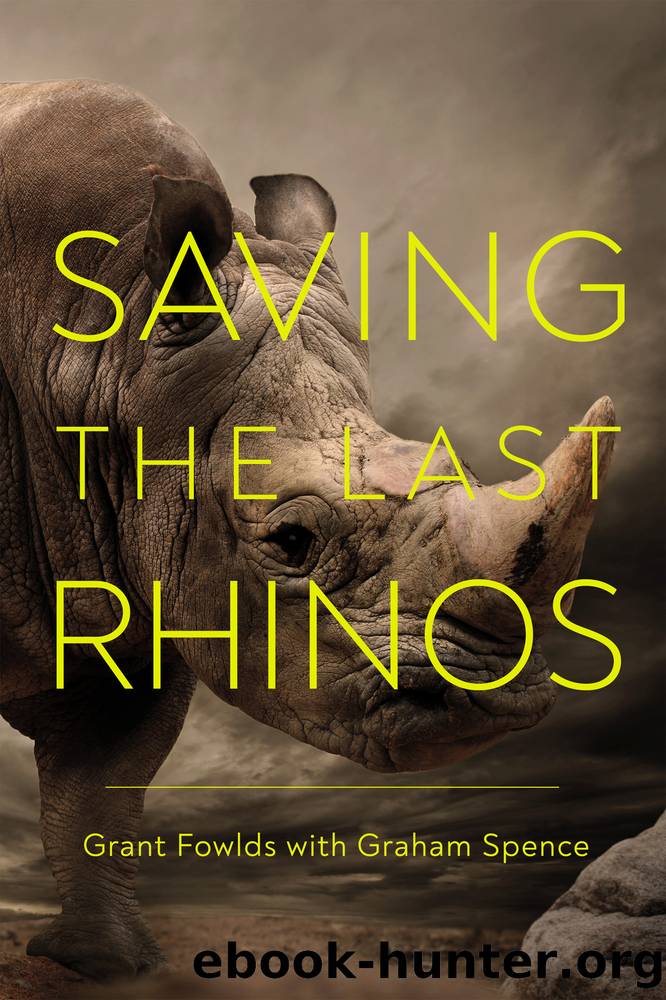Saving the Last Rhinos by Grant Fowlds

Author:Grant Fowlds
Language: eng
Format: epub
Publisher: Pegasus Books
Published: 2020-05-05T00:00:00+00:00
CHAPTER TWENTY: Hooves for Horns
For those who love the outdoors, there is nothing more enthralling than trekking in the backcountry on horseback.
It’s cemented into wilderness folklore, where horses were key for long-distance off-road transport and men and women of the bush often spent days camping out on the trail. We were going back to grassroots.
But perhaps just as entrancing was the ‘romance’ of the idea of reintroducing horses. We would be using animals to protect animals.
Horses have an exalted status in many parts of South Africa, right up there with the mustang in America. Legends abound of mystical relationships, and perhaps the most famous is that of farmer Wolraad Woltemade, who in 1773 rode his horse Vonk into pounding surf to rescue sailors from the galleon De Jonge Thomas wrecked off Cape Town. He made seven trips, pulling panic-stricken men to safety. Tragically, Woltemade and Vonk drowned on the eighth attempt as the ship broke up. Of the fifty-three survivors, fourteen owed their life to the heroic farmer and his horse. Vonk’s body was never recovered.
Another epic ride was that of KwaZulu-Natal trader Dick King and his sixteen-year-old servant Ndongeni, who raced on horseback to get help when Boer commandos besieged the British garrison at Durban in 1842. The nearest military outpost was at Grahamstown 600 miles away. King was lying low on a ship in Durban’s harbour at the time. When night fell he and Ndongeni swam their horses across the shark-infested channel. They then began a race for their lives, with King reaching Grahamstown in ten days on a trip that usually took seventeen. Ndongeni, who had no saddle or bridle, had to turn back after 250 miles – also an amazing feat by a youngster.
Alerted by King, a navy ship sped up the coast to Durban and the blockaded British soldiers, who were eating boot leather to stave off starvation, were saved. King was regarded as a hero by the British, but obviously not the Boers. However, no one disputes that his incredible ride through thick bush and fording more than a hundred crocodile-riddled rivers in ten days is an astonishing equestrian achievement. As Ndongeni could not swim, King had to pull the Zulu’s horse across rivers with the youth still mounted.
Interestingly, King’s horse, which was named Somerset, was originally stolen from the Boers by a Griqua bandit and sold to the British, which is how King got it. So the animal’s bloodline would be that of the hardy Boerperd, the same as those we are now using on modern anti-poaching patrols.
Horses have also always been an essential part of the country’s conservation story. Since the first game reserves were proclaimed more than a century ago, most rangers relied exclusively on horses to patrol the vast wild places where the only routes were animal tracks.
They were expert horsemen, and many of the older generation still are. They had to be. In Zululand rangers used horses to capture herds of antelope by the simple and extremely dangerous expedient of chasing the animals at full gallop into holding pens.
Download
This site does not store any files on its server. We only index and link to content provided by other sites. Please contact the content providers to delete copyright contents if any and email us, we'll remove relevant links or contents immediately.
Sapiens: A Brief History of Humankind by Yuval Noah Harari(13053)
The Tidewater Tales by John Barth(12030)
Do No Harm Stories of Life, Death and Brain Surgery by Henry Marsh(6336)
Mastermind: How to Think Like Sherlock Holmes by Maria Konnikova(6236)
The Thirst by Nesbo Jo(5786)
Why We Sleep: Unlocking the Power of Sleep and Dreams by Matthew Walker(5642)
Sapiens by Yuval Noah Harari(4537)
Life 3.0: Being Human in the Age of Artificial Intelligence by Tegmark Max(4508)
The Longevity Diet by Valter Longo(4445)
The Rules Do Not Apply by Ariel Levy(3906)
The Immortal Life of Henrietta Lacks by Rebecca Skloot(3826)
The Body: A Guide for Occupants by Bill Bryson(3802)
Why We Sleep by Matthew Walker(3773)
Animal Frequency by Melissa Alvarez(3755)
Yoga Anatomy by Kaminoff Leslie(3701)
Barron's AP Biology by Goldberg M.S. Deborah T(3632)
The Hacking of the American Mind by Robert H. Lustig(3580)
All Creatures Great and Small by James Herriot(3516)
Yoga Anatomy by Leslie Kaminoff & Amy Matthews(3396)
